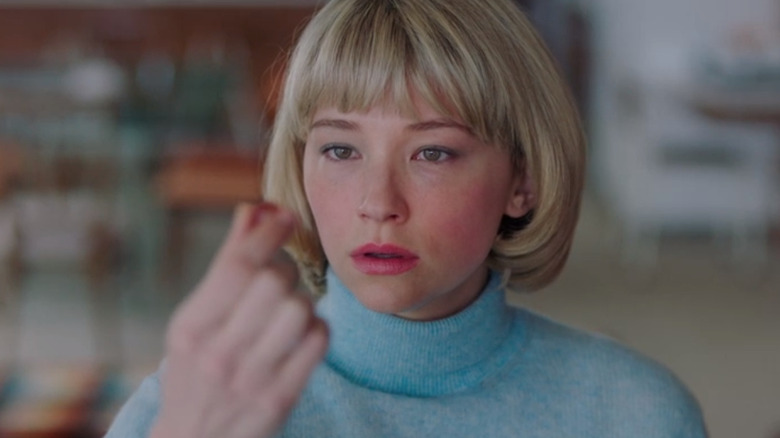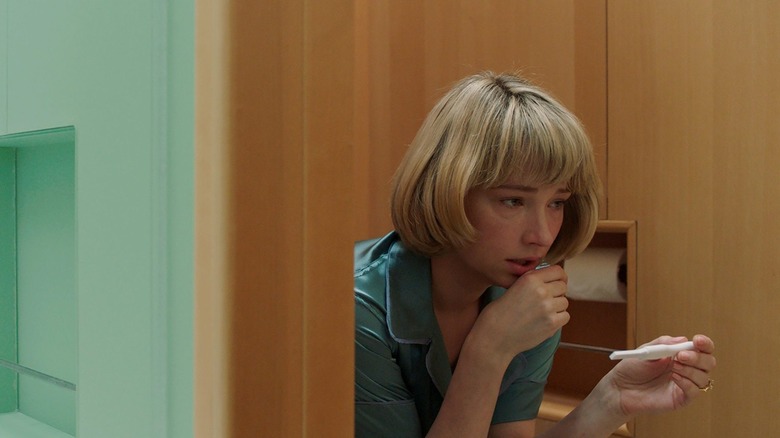The Horrors Of Swallow Explained
Carlo Mirabella-Davis' 2020 horror/drama "Swallow" initially presents itself as a strange body-horror story about a compulsion that most audience probably wouldn't understand. Haley Bennett ("Cyrano") plays Hunter Conrad, a young woman who recently married into a very wealthy family. Hunter was raised in a working class household, so her husband's sudden affluence is jarring and a little disorienting. Hunter has to get used to the way rich people communicate, but also what wealthy households might expect from a young, pretty wife. When Hunter becomes pregnant, she seems to have fulfilled her role, and her new husband (Austin Stowell) begins ignoring her. She is trapped in a rich home with no one to talk to, and no one who understands her.
It's then that Hunter first thinks to swallow a marble. Somehow, swallowing the marble fills her with calm.
It's not long before Hunter expands her swallowing to include larger, more dangerous objects. She swallows pushpins, thumbtacks, paperclips. She swallows batteries and gameboard pieces. She'll work her way up to whole screwdrivers. Hunter's compulsions will eventually land her in the hospital, where she will be diagnosed with a very real condition call pica, a psychological illness that drives people to eat things that aren't food.
At that point, "Swallow" could have taken a hard left into horror territory, following Hunter's deep descent into sharp object related self-harm, and the increasing size and sharpness of the things she was moved to ingest. Instead, though, the film begins to delve, sensitively, into Hunter's psychology, her past, and why she was afflicted with pica to begin with. It eventually becomes a story of a young woman confronting the darkest part of her past, including a conversation with her biological father.
Swallow examines the condition of pica
Pica is typically talked about as an eating disorder, but there isn't a single, diagnosable cause. In some cases, people are moved to eat things that aren't food because they suffer from major vitamin deficiencies and their bodies crave, say, the iron present in paint or the calcium they perceive to be present in chalk. If you knew a kid in school who would eat paste, it's likely they weren't getting the right diet at home. Indeed, there are many subsets of pica, including pagophagia (the eating of ice), trichophagia (the eating of hair), and geophagia (the eating of dirt). Hunter is afflicted mostly with acuphagia, which draws people to eat sharp objects. Pica isn't considered an official disorder until it has persisted for at least a month.
Pica most commonly affects pregnant women, curiously, and it's usually linked to iron deficiencies. In the film "Swallow," however, it's more complicated than that. Hunter is clearly uncomfortable with her new husband and his family. She feels neglected and is almost immediately abandoned in her home when she gets pregnant. Her husband is annoyed by her complaints. The pica is not an attention-getting technique, but an odd way to fill herself.
Hunter will eventually talk to a shrink about her past. It seems that she never met her biological father, who went to prison for sexually assaulting her mother and fathering Hunter against her mother's will. Hunter, as one might intuit, feels unwanted, like she was forced on her mother, and that her father sees her as a result of criminal shame. She seems to have assumed that marrying into a rich family would surround her with warmth and purpose, but the opposite happened.
Her anxieties manifested as pica.
Swallow offers closure, and a pro-abortion message?
"Swallow" doesn't make the connection explicit, but there's a definite link between Hunter filling her body with metal objects and her body carrying a fetus. Clearly, Hunter has a lot of anxiety about motherhood and childhood, having been the result of an unwanted pregnancy. She sees being born as a shameful act and a fetus as, essentially, a foreign object inside a woman's body. She is not happy to be pregnant and eventually confesses that she only wanted a baby because she knew it's what her rich in-laws wanted. Rich people procreate in relaxed environments, Hunter felt, and if she was knocked up by a rich man, then she could "re-stage" her views of pregnancy as something placid and sweet.
But that's not the way things work. Eventually, she'll have to confront her biological father, find out how he feels about her, and then seek an abortion. She doesn't want to be pregnant, and the circumstances of her own birth kind of dictated that.
In a subtle way, Mirabella-Davis' screenplay is confronting myths often perpetuated by anti-abortion pundits. A common question one might hear from such a pundit is whether or not a pro-abortion advocate is grateful their own mother didn't get an abortion. In Hunter's case, she doesn't feel grateful that she was born, and understands that having a baby is a complicated choice that can feel wrong for a myriad of reasons. Pregnancy isn't a blessing, but a demand, a burden, a strange filling of one's body. For Hunter, a sharp object in her abdomen felt just as natural. Perhaps, the film argues, abortion should be an option.


